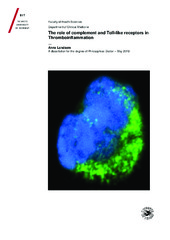The role of complement and Toll-like receptors in thromboinflammation
Permanent link
https://hdl.handle.net/10037/15243View/
Date
2019-05-23Type
Doctoral thesisDoktorgradsavhandling
Author
Landsem, AnneAbstract
Has part(s)
Paper I: Landsem, A., Fure, H., Christiansen, D., Nielsen, E.W., Østerud, B., Mollnes, T.E. & Brekke, O.L. (2015). The key roles of complement and tissue factor in Escherichia coli-induced coagulation in human whole blood. Clinical & Experimental Immunology, 182(1), 81-89. The paper is not available in Munin due to publisher restrictions. Available at https://doi.org/10.1111/cei.12663.
Paper II: Landsem, A, Fure, H., Mollnes, T.E., Nielsen, E.W. & Brekke, O.L. (2015). C1-inhibitor efficiently delays clot development in normal human whole blood and inhibits Escherichia coli-induced coagulation measured by thromboelastometry. Thrombosis Research, 143, 63-70. The paper is available in the thesis introduction. Also available at https://doi.org/10.1016/j.thromres.2016.04.024.
Paper III: Landsem, A., Fure, H., Ludviksen, J.K., Christiansen, D., Lau, C., Mathisen, M.T. … Brekke, O.L. (2018). Complement component 5 does not interfere with physiologic hemostasis but is essential for Escherichia coli-induced coagulation accompanied by Toll-like receptor 4. Clinical and Experimental Immunology, 196(1), 97-110. Also available at https://hdl.handle.net/10037/14751.
Paper IV: Gustavsen, A, Nymo, S., Landsem, A., Christiansen, D., Ryan, L., Husebye, H. … Mollnes, T.E. (2016). Combined Inhibition of Complement and CD14 Attenuates Bacteria-Induced Inflammation in Human Whole Blood More Efficiently Than Antagonizing the Toll-like Receptor 4-MD2 Complex. The Journal of Infectious Diseases, 214(1), 140-150. Also available at https://hdl.handle.net/10037/10421.
Publisher
UiT The Arctic University of NorwayUiT Norges arktiske universitet
Metadata
Show full item recordCollections
The following license file are associated with this item:
Related items
Showing items related by title, author, creator and subject.
-
Prognostic Impacts of Angiopoietins in NSCLC Tumor Cells and Stroma : VEGF-A Impact Is Strongly Associated with Ang-2
Andersen, Sigve; Dønnem, Tom; Al-Shibli, Khalid Ibrahim; Al-Saad, Samer; Stenvold, Helge; Busund, Lill-Tove; Bremnes, Roy M. (Journal article; Tidsskriftartikkel; Peer reviewed, 2011)Angiopoietins and their receptor Tie-2 are, in concert with VEGF-A, key mediators in angiogenesis. This study evaluates the prognostic impact of all known human angiopoietins (Ang-1, Ang-2 and Ang-4) and their receptor Tie-2, as well as their relation to the prognostic expression of VEGF-A. 335 unselected stage I-IIIA NSCLC-patients were included and tissue samples of respective tumor cells and ... -
The Temporomandibular Joint in Juvenile Idiopathic Arthritis, focusing on Quality of Life, Oral Microbiome and Intervention
Frid, Paula (Doctoral thesis; Doktorgradsavhandling, 2020-10-02)The temporomandibular joint (TMJ) is commonly involved in juvenile idiopathic arthritis (JIA), and may lead to impaired mouth opening, pain and facial growth disturbances. Asymptomatic TMJ arthritis may be diagnosed late in the disease course, thus management is challenging. The overall objectives of this thesis were to provide new knowledge on quality of life (QoL), the oral microbiome and interventions ... -
Humant papillomavirus : en litteraturstudie om HPV, dets relasjon til cancer og tiltak mot videre spredning av virus
Gabrielsen, Endre (Master thesis; Mastergradsoppgave, 2012-06-01)I 1983 oppdaget zur Hausen sammenhengen mellom Humant Papillomavirus (HPV) og livmorhalskreft. På denne tiden visste man ikke at det var HPV som var årsaken til at Helaceller kunne leve in vitro. Ny forskning relaterer HPV til en rekke andre cancertyper. En stor andel anal-, oropharyngeal-, penis-, vaginal-, og vulvacancer skyldes HPV. Det er også påvist HPV i tumorvev fra øsofagus, larynx, lunge, ...


 English
English norsk
norsk



